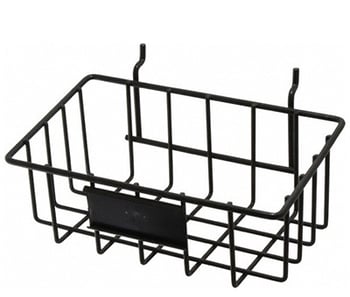 Normally, when using a stainless steel alloy for a custom wire basket design, the basket will be uncoated. After all, the point of using stainless steel is to take advantage of its resistance to oxidation/corrosion. However, in some situations even stainless steel baskets will require a coating.
Normally, when using a stainless steel alloy for a custom wire basket design, the basket will be uncoated. After all, the point of using stainless steel is to take advantage of its resistance to oxidation/corrosion. However, in some situations even stainless steel baskets will require a coating.
Here are a few of the most frequently asked questions about Marlin’s coated wire baskets that are made using stainless steel:
1: Why Would You Coat Stainless Steel in the First Place?
There are many kinds of stainless steel alloys, each with specific degrees of resistance to chemical compounds. If you're picking stainless steel for a manufacturing basket design, it’s typically because that alloy will be resistant to whatever chemicals will be used in the manufacturing process.
However, chemical resistance isn’t the only factor in selecting a custom basket design. For example, some manufacturers have parts that are ultra-delicate, and have a “no-scratch” surface requirement. Here, the hard surface of a steel basket could damage the parts it holds, so a coating might be used as a shock absorber to keep parts from getting damaged.
Another reason to coat stainless steel is to increase the utility of the basket. A particular stainless steel alloy (such as grade 316 SS) might be resistant to chlorides in one manufacturing process, but not to some highly-concentrated acids in others.
To make that same basket useful for both processes, a protective coating might be applied. This allows the basket to be used with a wider variety of chemicals and processes.
2: Why Not Just Use Plastic Baskets?
You might be wondering: “if the protective coating can withstand the chemicals in both processes, then why not just make the basket out of the coating material and be done with it?”
The biggest issue here concerns the tensile strength of many coating materials, such as PVC. Even the strongest plastics pale in comparison to the tensile strength of steel.
For example, consider Polyimide & glass fiber, one of the strongest polymers available. According to statistics from MatWeb’s Material Property Data sheet, this polymer has an ultimate tensile strength of 150 MPa (Megapascals), which translates to roughly 21,755.7 psi. Grade 304 stainless steel, on the other hand, has an ultimate tensile strength of 579 MPa (83,976.9 psi). This makes 304 stainless steel nearly 4 times as strong as Polyimide + glass fiber. PVC (52 MPa) doesn’t even come close to matching stainless steel.
Also, when heated to 180 degrees Fahrenheit, plastics tend to lose a lot of their tensile strength (or melt), while grade 304 stainless steel is largely unaffected at such temperatures.
This makes coated wire baskets with stainless steel coverings much stronger than plastic baskets. This has the added benefit of increasing the useful life of the basket.
3: What Kind of Coating Should I Use for My Process, Then?
The answer to this question is: it depends on the process and the parts/products you’re manufacturing. There are many different materials that you could use to make a coated wire basket, and each material has properties that make them uniquely suited to certain tasks.
For example, some fluoropolymers, like FEP and PTFE, have higher than average temperature tolerances, nonstick properties, and excellent resistance to chemical corrosion. This makes them useful for high-temperature applications in which a basket’s surface must be easy to clean. Examples of this can be found in the food/hospitality industries, as well as in pharmaceutical manufacturing sterilization processes.
PVC, on the other hand, is often thicker and softer than steel, making it useful for applications in which parts have delicate surfaces and “no-scratch” requirements.
Covering all of the potential coatings for wire baskets and their uses in detail against every possible manufacturing application would be impossible to do in a blog post. Rather than wondering if a coating might be right for your manufacturing baskets, contact an experienced mechanical engineer to go over the details of your manufacturing process and requirements.
These are just a few of the questions that we've heard concerning coated wire baskets. Do you have a question about coated wire baskets that you want answered? If so, then contact Marlin Steel today!



.gif)


